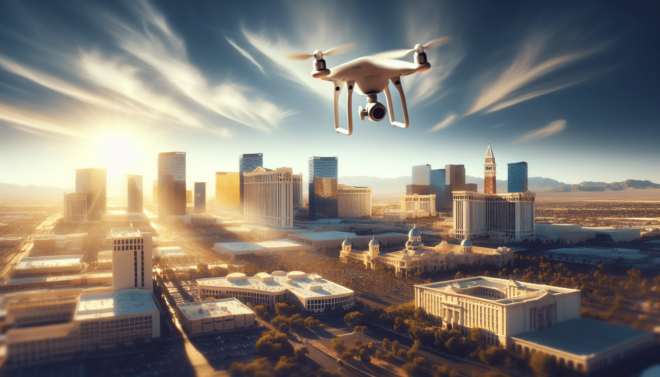Have you ever wondered why drones are prohibited near some areas, like schools and universities, particularly in Las Vegas? With the rising popularity of drones for both recreational and professional use, understanding where and why their use is restricted is crucial. Let’s take a deeper look at this topic to understand the reasoning and regulations behind these drone bans.
Growing Popularity of Drones
Drones have become increasingly popular in recent years, transforming from niche gadgets into mainstream tools. They’ve found applications in photography, delivery services, agriculture, and infrastructure inspections, among other fields. But as their use expands, so does the need to regulate their operation, especially in sensitive areas.
Benefits of Drone Technology
Before diving into the regulations, it’s important to highlight the vast benefits drones offer. They allow aerial photography that wasn’t accessible before, they help in rescue missions by covering large areas quickly, and they even contribute to scientific research. Their applications seem limitless; however, their growing ubiquity prompts a closer look at how they might impinge upon privacy and safety concerns.
Rise in Recreational Use
Recreational drone use has skyrocketed, with hobbyists eager to capture breathtaking views. While this sparks creativity and fun, it also brings its share of challenges. Drone users, particularly beginners, may not always be aware of regulations or potential hazards, leading to unintended consequences.
Regulations on Drone Usage
As drones become part of everyday life, governing bodies at various levels have implemented rules to ensure they are used safely and responsibly. These regulations cover diverse aspects, from their manufacturing standards to where and how they can be flown.
Federal Aviation Administration (FAA) Guidelines
In the United States, the FAA plays a critical role in regulating drone usage. Their guidelines are designed to ensure safety for everyone in the air and on the ground. They require drones to be registered, especially if they weigh more than 0.55 pounds. The rules also mandate that drones must follow specific flight paths and stay clear of certain zones.
State and Local Regulations
Beyond FAA regulations, states and local governments may impose additional restrictions. These rules can address concerns specific to the region. For instance, a local regulation might stem from an area’s unique geography or the presence of sensitive infrastructure.
Reasons for Banning Drones Near Schools and Universities
Understanding why drones are banned near educational institutions, particularly in a bustling city like Las Vegas, involves considering various safety, privacy, and operational factors.
Safety Concerns
Safety is a primary reason for restricting drones around schools and universities. Large crowds of students, high traffic areas, and frequent events create a high-risk environment. A malfunctioning drone or an inexperienced operator poses a serious threat in these environments, potentially causing injury or damage.
Privacy Issues
Drones equipped with cameras raise significant privacy concerns. They have the potential to capture images or videos without people’s consent. In educational settings, where minors are often present, this issue becomes even more sensitive. Schools and universities prioritize maintaining a secure environment for their students, and unchecked drone activity could compromise this privacy.
Disruption of Educational Activities
Drones can be disruptive, with their buzzing sound or visual presence potentially interrupting classes or events. Schools and universities aim for an uninterrupted and focused learning environment, which can be disrupted by unauthorized drone flights.
Specific Regulations in Las Vegas
Las Vegas, known for its vibrant city life and numerous institutions, implements particular regulations to address the unique challenges drones pose in this urban landscape.
Clark County’s Role
Clark County, where Las Vegas is located, has specific ordinances that address drone usage. These regulations stipulate restricted flight zones, particularly around schools and universities, to protect residents and students.
Las Vegas Educational Institutions
The proximity of Las Vegas’ educational institutions to tourist attractions and heavily populated urban areas necessitates stringent drone regulations. These institutions often collaborate with local authorities to ensure effective enforcement.
Collaboration with Local Enforcement
Las Vegas law enforcement agencies work closely with schools and universities to monitor and manage drone activities. They might deploy technology to detect unauthorized drones and respond swiftly to any breaches.
Legal Consequences of Violating Drone Restrictions
Violating drone restrictions can lead to serious legal repercussions, reinforcing the importance of awareness and compliance with regulations.
Penalties and Fines
Operating a drone in a restricted zone can result in fines, confiscation of equipment, or even more severe legal consequences. These penalties underscore the importance of adhering to the rules.
Importance of Following Regulations
By understanding and following local laws, drone operators can avoid legal issues and contribute to safety in shared spaces. Awareness campaigns and educational resources are vital in promoting responsible drone usage.
How to Stay Informed and Compliant
Remaining informed about the latest drone regulations helps operators avoid unintentional violations and supports community safety.
Resources for Drone Operators
Various resources are available for drone operators to stay updated on regulations. Websites, mobile apps, and local workshops provide valuable information to ensure compliance.
Participating in Community Discussions
Engaging with local drone communities and discussions can be beneficial. These networks offer opportunities to share experiences, learn about new regulations, and advocate for responsible drone use.
The Future of Drone Regulations Near Schools and Universities
The drone industry continues to evolve, and so do the regulations governing it. The future will likely see a balance between embracing technological advancements and ensuring public safety.
Emerging Technologies
Innovations in drone technology could address some of the existing concerns. Enhanced safety features, improved privacy settings, and advanced detection systems might mitigate current risks.
Potential Changes in Regulations
As technology evolves, regulations may adapt to accommodate new modes of operation. Collaborative efforts between manufacturers, regulatory bodies, and educational institutions could lead to more dynamic and effective rules.
Educational Initiatives
Educational programs that raise awareness about drone usage and regulations could play a crucial role in fostering a culture of responsibility among operators. Schools and universities might integrate these topics into their curricula to educate students about the legal and ethical aspects of drone use.
In conclusion, understanding why drones are banned near Las Vegas’ schools and universities involves a mix of safety, privacy, and regulatory considerations. As technology advances, staying informed and adapting to regulations will remain critical for both operators and the community. Together, responsible use of drones can coexist with the need to protect and preserve safe learning environments.

